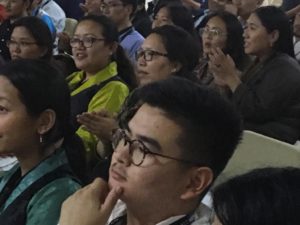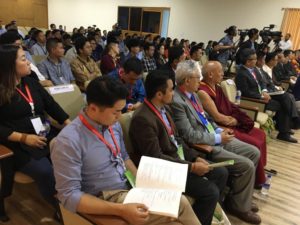A select group of one hundred young Tibetans from all over the world gathered from August 16 to 19 for the Second Five-Fifty Youth Forum, organised by the Central Tibetan Administration (CTA) in Dharamshala.
CTA’s official website reported that the forum saw discussion, debate, and learning from one another while the participants chalked out action plans regarding the future political status of Tibet. During this time they discussed themes ranging from: ‘Tibet and PRC ‘(People’s Republic of China); ’Inclusion of and Responsiveness to Tibetans inside Tibet and the Diaspora’; ‘Young voices in the Tibetan Freedom Movement’ and ‘CTA leadership towards the Five-Fifty vision’.
During the opening ceremony, Lobsang Sangay, the President of the CTA, also known as the Tibetan Government-in-exile, highlighted the challenges faced in maintaining world attention on the situation in Tibet. “The Tibetan situation is not lost,” he said confidently. Addressing concerns that Tibetans in exile would lose their culture, he advised the youth, “Integrate, do not assimilate.”
Speaking during a break in proceedings, Tsewang Gyalpo Arya, the Secretary of the CTA’s department of Information and International Relations, stated that Tibetans should preserve their culture. In this way they would act as a torch bearer for those following.
Participant Kalsang Dorjee from Switzerland was very excited about attending the gathering. He stated, “It is very important to cultivate our culture.” He added, “It is our moral duty to stand up for our country.”
Participant Phurbu Dolma from Dharamshala is currently undergoing a gap year in her studies. She believes that it is important to be aware of Tibetan history and politics. Looking forward, she expects a time of rapid change in Tibet, and states that a key challenge for Tibetan youth is the way in which they will maintain their identity.
In his key remarks during the valedictory session, Secretary Sonam Norbu Dagpo of the CTA was quoted by tibet.net as saying, “The past history of Tibet reveals that Tibet was an independent nation but this fact has been misconstrued and fabricated by China’s narrative of Tibet.” He therefore urged participants to devise strategies to counter such misrepresentations.
In his concluding remarks, President Dr Lobsang Sangay said that the forum had been established for young Tibetans to examine the political role they can create for Tibet. He was positive that this goal had been achieved.
According to phayul.com, an independent news service, the Five-Fifty Policy calls for a revitalisation of the Tibetan people’s struggle to seek genuine autonomy through the ‘Middle Way Approach’ in the next five years , while strategising to embolden and sustain the Tibetan movement over the next fifty years as a contingency plan.







 Print
Print Email
Email